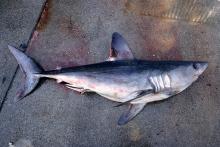ABNJ Tuna Project Completes Southern Hemisphere Porbeagle Shark Assessment

December 2017 | Wellington. The ABNJ Tuna Project has released the first ever global shark assessment with the completion of a multi-national effort to assess the status of the Southern Hemisphere porbeagle shark (Lamna nasus). Highly migratory fish stocks often cross political boundaries requiring a number of different countries to cooperate in their assessment and management. Lack of information on catches and biological characteristics for less abundant shark species add another layer of complexity to the task. The ABNJ Tuna Project has taken up this challenge by undertaking four shark assessments for stocks which span the Pacific, or in the case of the porbeagle shark, the entire Southern Hemisphere.
The study was initiated by the Commission for the Conservation of Southern Bluefin Tuna (CCSBT) which acknowledges the porbeagle shark as an ecologically-related species. Responding to CCSBT’s request and noting that the porbeagle shark is a designated key shark species for the Western and Central Pacific Fisheries Commission (WCPFC), WCPFC Executive Director Feleti Teo said “The bycatch issues we face affect populations that range beyond our borders and so we welcome the opportunity to address these issues not only within the WCPFC but in their broader context.” The study was coordinated by the WCPFC’s Dr Shelley Clarke and conducted by the National Institute of Water and Atmospheric Research (NIWA) of New Zealand.
The key data holders, which were identified as Argentina, Chile, Japan, New Zealand and Uruguay, had not previously collaborated on a stock status assessment and are not all members of WCPFC or CCSBT. As a result, rather than centrally compiling the data into a single dataset, NIWA worked with each data holder to produce stock status indicators, and those indicators provided input to and context for a risk-based assessment framework. Onsite analysis was undertaken in three of the five countries and webinars were used to share information amongst the study participants.
The risk assessment evaluates whether current impacts from fisheries exceed a maximum impact sustainable threshold (MIST) defined based on population productivity. This approach differs from traditional stock assessments because it evaluates whether the population's ability to withstand fishing pressure is exceeded, rather than evaluating biomass and whether the population is overfished. For all regions combined (Eastern Atlantic Ocean to Western Pacific Ocean) the fishing mortality was less than 18% of the most precautionary MIST in all years assessed (1992-2014) and fell to half that level in more recent years (2010 -2014). Applying less conservative MISTs and assuming that some porbeagles survive their encounter with the fishery results in fishing mortality estimates that are considerably lower. Although the available data indicate there is a very low risk that the Southern Hemisphere porbeagle shark is subject to overfishing anywhere within its range, the study recommends data improvement through liaison between regional fishery bodies.
WCPFC is implementing three ABNJ Tuna Project bycatch components designed to improve data, develop new assessment methodologies and enhance management of sharks within the t-RFMOs. In addition to this latest assessment of porbeagle shark, assessment of Pacific bigeye thresher shark has been completed, assessment of the Pacific silky shark is underway, and a whale shark assessment will begin shortly.
The Common Oceans ABNJ Tuna Project is funded by the Global Environment Facility (GEF) with the Food and Agriculture Organization of the United Nations (FAO) as the implementing agency. This Project harnesses the efforts of a large and diverse array of partners, including the five tuna Regional Fisheries Management Organizations (RFMOs), governments, inter-governmental organizations, non-governmental organizations and private sector to achieve responsible, efficient and sustainable tuna production and biodiversity conservation.

